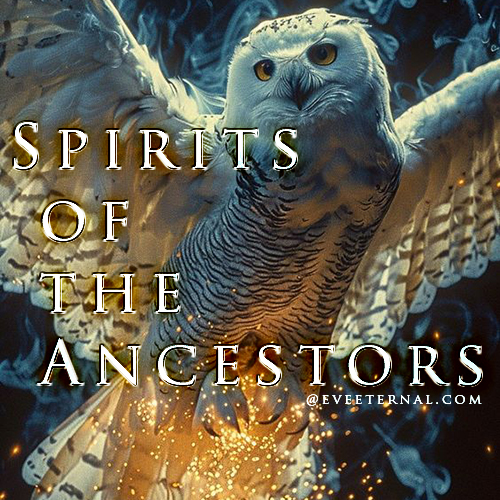Spirits of the Ancestors:
“Honoring Your Lineage with Rituals”
The connection between the living and the departed is a sacred bond that spans generations. Across cultures and traditions, honoring one’s ancestors has been a way of paying tribute to those who came before us, acknowledging their influence on our lives, and seeking their wisdom and guidance. The spirits of our ancestors are often seen as protective, guiding forces, watching over us and influencing the path we walk today. By engaging in rituals to honor them, we not only strengthen this connection but also open ourselves to the deeper meaning of our own lives and purpose.
In this blog post, we’ll explore the importance of honoring your ancestors, how different cultures have kept this practice alive, and how you can incorporate rituals into your spiritual practice to honor and connect with your lineage. Whether you are looking to heal ancestral wounds, celebrate your heritage, or simply express gratitude for those who came before you, ancestor rituals can be a profound and meaningful way to engage with your lineage.
The Importance of Honoring Your Ancestors
Honoring your ancestors goes beyond simple remembrance. It’s about acknowledging the impact your lineage has on your present life. Our ancestors’ experiences, struggles, and achievements shape who we are, not only through genetic inheritance but also through the cultural, emotional, and spiritual imprints passed down through generations.
- Connection to Identity and Heritage: Engaging with your ancestry helps you understand where you come from. Knowing the stories of your family and their experiences can give you a greater sense of identity, pride, and belonging. Rituals allow you to maintain and strengthen this connection to your roots, especially if you live far from your cultural or familial origins.
- Healing and Reconciliation: Not all ancestral stories are joyful. Some families carry the weight of trauma, conflict, or unhealed wounds. Rituals that honor ancestors can be a way to bring healing and reconciliation, offering peace to the souls of the departed and breaking cycles of pain that may still affect the living.
- Seeking Guidance and Protection: Many spiritual traditions view ancestors as wise guides and protectors. By acknowledging and honoring them, you invite their support into your life. Their presence can offer insight during difficult times, protection from harm, and blessings for prosperity and well-being.
- Continuing the Legacy: Ancestor rituals help us maintain a living connection with our lineage, ensuring that the values, lessons, and traditions of those who came before are carried forward. In honoring them, we keep their memory alive and ensure their legacy continues.
Ancestor Worship Across Cultures
Ancestor veneration is a practice found in many different cultures around the world. Though the specific rituals may vary, the core principle—honoring those who came before—remains the same. Here’s a look at how some cultures honor their ancestors:
- Chinese Ancestral Worship: In Chinese culture, honoring ancestors is central to family life. Offerings of food, incense, and prayers are made at ancestral altars to maintain a connection with the spirits of the deceased. During important holidays like Qingming Festival, families visit ancestral graves, clean them, and make offerings to ensure that their ancestors are at peace in the afterlife.
- Mexican Day of the Dead (Día de los Muertos): Celebrated primarily in Mexico, Día de los Muertos is a vibrant and colorful holiday that honors deceased loved ones. Families build altars (ofrendas) decorated with photos, candles, marigolds, and the favorite foods and drinks of the departed. It’s believed that on this day, the spirits of the ancestors return to the earthly realm to celebrate with their families.
- African Ancestral Veneration: In many African cultures, ancestors are viewed as spiritual intermediaries between the living and the divine. Libations, prayers, and offerings of food are common ways of communicating with and honoring the ancestors. These rituals help ensure the continued protection, guidance, and blessings of the ancestors.
- Samhain in Celtic Tradition: In ancient Celtic traditions, Samhain marked the time when the veil between the living and the dead was thinnest. It was believed that during this time, the spirits of the ancestors returned to the earth. Offerings of food and drink were left for them, and bonfires were lit to guide their way.
Creating Your Own Ancestral Rituals
If you feel called to honor your ancestors but are unsure where to begin, creating your own rituals can be a beautiful and personal way to connect with your lineage. These rituals don’t have to follow strict guidelines; they should feel meaningful to you and reflect your relationship with your ancestors. Here are a few steps to get started:
1. Set Up an Ancestral Altar
An altar is a sacred space dedicated to your ancestors, where you can make offerings and connect with them. It doesn’t have to be elaborate; a small table or shelf with a few symbolic items is enough. Here are some ideas for what you might include:
- Photos of your ancestors or objects that represent them.
- Candles to honor the light and guidance they provide.
- Offerings such as food, drinks, incense, or flowers—especially items that your ancestors enjoyed in life.
- Crystals or other spiritual tools to enhance the energy of the space (black tourmaline for protection, rose quartz for love and healing).
Take time to sit in front of the altar regularly, light candles, and speak to your ancestors. Express gratitude, ask for their guidance, or simply reflect on their lives and how they shaped your own.
2. Offer Food and Drink
Offering food and drink is a common way to show respect and gratitude to ancestors. In many traditions, it’s believed that the spirits of the dead can partake in the essence of these offerings. You can leave out small portions of food or drink during special times, such as on anniversaries, during certain holidays, or when you feel particularly connected to your ancestors.
3. Engage in Reflection and Prayer
Rituals don’t always require physical offerings; sometimes, quiet reflection or prayer can be the most powerful way to honor your ancestors. Meditate on their lives, the challenges they faced, and the wisdom they passed down. Ask for their guidance in your own struggles, and listen for the subtle ways they may communicate with you.
4. Perform Ancestral Healing Work
If you’re aware of generational patterns of trauma or dysfunction in your family, consider performing healing rituals to break those cycles. This could involve lighting candles for peace, saying prayers of forgiveness, or writing letters to ancestors who may have been hurt or hurt others. Through intention and ritual, you can help heal not only yourself but also the spirits of your lineage.
5. Celebrate Your Ancestors
Finally, don’t forget to celebrate your ancestors! Rituals don’t have to be solemn or somber. Hold a joyful gathering with family members, tell stories about your ancestors, cook their favorite meals, or engage in cultural traditions that they practiced. By celebrating their lives, you bring their memory to life in a meaningful way.
Conclusion: Honoring the Spirits of Your Lineage
Honoring your ancestors through rituals is a profound way to maintain a connection with your lineage, seek guidance and protection, and foster healing across generations. Whether through simple offerings, prayers, or elaborate celebrations, these rituals serve as a reminder that we are never truly alone—our ancestors walk with us, supporting and guiding us every step of the way.
By embracing the spirits of your ancestors, you acknowledge the vital role they play in your life and continue the sacred bond that spans time and space. Let your rituals be a reflection of the love, respect, and gratitude you hold for those who came before you, and may their spirits always be a source of wisdom and strength.


